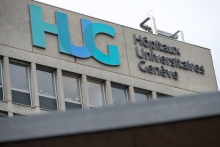Worsening working conditions in the Swiss health sector

Switzerland is globally reputed for having one of the world’s best healthcare systems. This could however be undermined by declining terms and conditions of work. Health workers constitute the backbone of healthcare services delivery and require decent work to render their services appropriately. But this is increasingly not being the case.
Healthcare workers are being overburdened with work. Staff are facing burnout, and absenteeism has risen to 10%. The situation is particularly terrifying at the Geneva University Hospitals, HUG (Hôpitaux universitaires de Genève), which operates 8 hospitals in the Canton of Geneva and also runs 40 outpatient clinics.
A 10-hour working day was recently introduced, which the PSI affiliate Syndicat Suisse des Services Publics (SSP) has kicked against. Speaking through its spokesperson, Nicolas de Saussure, the HUG management argues that this is not a holistic re-structuring of shift time, which of course would be against the law. She points out that there are now three types of working time schedules; 8-hour, 10-hour and a mix of both.
The HUG management also tries to justify this flexibilization of worktime, particularly at its main facility, with its ongoing infrastructure expansion project. The hospital’s bed spaces are set to increase with six more blocks being added to the existing eight. But the truth is actually more complicated, and less humane.
The pressures being mounted on health workers is partly a result of cost-cutting measures by the HUG management in response to the state’s proposed implementation of further reform of the medical tariff system known as TARMED (Tarif Médicaux). Due to this worrisome measure, the hospital management hinted in June that it would not replace at least 90 of the 300 workers retiring by the end of the year.
The 2012 Health Insurance Act also entrenches the commercialisation and outsourcing of healthcare delivery, leading to the depletion of resources available for running public healthcare delivery and consequently undermining the quality of health services. Syndicat Suisse des Services Publics (SSP) commenced a Quality of Care Over Profitability campaign last year, in resistance to this. The union has also expressed its concerns over the introduction of 10-hour work shifts unilaterally by management, and called for discussions.
Rosa Pavanelli, the PSI General Secretary notes that:
"All hands should be on deck to ensure inclusive development. This is not possible without universal access to quality health. And it is impossible to guarantee this, when health workforce shortages are promoted by government policies that endorse profit over people. The public health system is a bulwark for universal health coverage and the spine of this bulwark are the women and men delivering services to the people. PSI stands firmly with SSP and its members in demanding improved working conditions, which include safe and effective staffing for health. It is indefensible for the HUG management to be considering what amounts to an effective reduction of staff when even the numbers available are not enough to service the needs of patients. What is needed now is an expansion of the health workforce in Switzerland and definitely not its reduction."
Read more: Soutien international aux revendications du SSP dans la santé (SSP-VPOD website)

